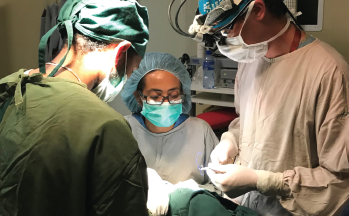
Dr. Wiedermann and his team perform surgery at Ayder Comprehensive Referral Hospital
in Mekelle, Ethiopia.
Courtesy Dr. Wiedermann
Josh Wiedermann, MD, is an otolaryngology–head and neck surgeon with Ayder Comprehensive Referral Hospital of Mekelle University in Mekelle, Ethiopia. He recently completed his residency at George Washington University Hospital in Washington, D.C., and his pediatric fellowship at Northwestern’s Lurie Children’s Hospital in Chicago. He has recently moved to Mekelle, Ethiopia with the mission of helping to build an otolaryngology residency program. ENTtoday talked to Dr. Wiedermann about his involvement in the program.
ENTtoday: Why did you join a residency program abroad?
Dr. Wiedermann: Two things drove my desire. The first was a passion to teach that grew roots in medical school at George Washington University. I joined a medical education concentration track that allowed me to learn more about the art and science of education. Second, I was fortunate to be able to travel to Botswana the summer between my first and second years of medical school to join the Baylor International Pediatric AIDS Initiative there. I was able to contribute to educational modules about pediatric AIDS, and the experience also instilled in me a desire to contribute to medical education efforts in resource-poor settings.
My love for teaching and international healthcare continued during my otolaryngology residency, but I also came to realize that I wanted to accomplish more meaningful and long-lasting contributions than I could achieve with just a few-month stay in an international setting. After searching through various options, I flew to Mekelle in Ethiopia during my fellowship for a whirlwind visit. I met with the otolaryngology group, including a fresh cadre of residents, at Ayder Comprehensive Referral Hospital and Mekelle University.
It was love at first sight for me. The welcome was overwhelmingly enthusiastic, and everyone seemed excited for the opportunity, especially the new residents. I knew that I wanted to invest at least a year of my early career in helping this wonderful group develop a high-quality otolaryngology training experience. It was a way to create a self-sustainable and efficient educational environment to improve the health of a population. After all, the opportunity to provide healthcare to those who need it is why most of us become doctors in the first place.
Every day I am pushed out of my comfort zone, and every day I learn something new. —Josh Wiedermann, MD
ENTT: How does the program work?
JW: The department has been run by Dr. Yilkal Zemene for the last six years. He is a tireless and selfless leader who gives all the energy he has to make this department great. The hospital is run by a young, soft-spoken, and extremely insightful physician, Dr. Amanuel. He envisions Ayder Hospital to be the focal point for excellent subspecialty care for the country and has been an outspoken advocate for our goals. He understands the benefit of filling the educational/skill gaps of any program. The hospital is very large and is the finest healthcare option for a large area of northern Ethiopia. The pathology is broad and endless, creating a significant need for subspecialty surgery. Over the years, the otolaryngology department has gathered an impressive range of technology and equipment. Thus, there exist the means to treat the need.
After I met with the residents and understood better how otolaryngology was being taught, I identified some gaps that I thought I could help fill, even though I was fresh out of my pediatric otolaryngology fellowship training. By filling these gaps, the department would be better equipped to use their existing means to treat their population’s diverse needs.
ENTT: What benefit does working with the program bring to your life?
JW: It was the answer to this question that really made the decision to move to Mekelle an easy one. I moved here to benefit myself; although my friends and family laud my altruism, ultimately, this was a selfish decision. Not only did I want to fulfill my goals of maximizing my impact on the health of individuals and populations, I also wanted to become a better doctor. There were points during my medical training when I felt a little removed from the big picture of medicine, too focused on the intricacies of otolaryngology to see the broader scope of life-and-death decisions and quality of life. Additionally, the art of physical diagnosis fades, because the majority of patients referred to subspecialty surgeons reach us with a diagnosis in hand, often with the aid of multiple tests.
From my brief visit to Mekelle over a year ago, I realized practicing here would push me harder than ever before. Already, in just a few short months here, I’ve experienced the frustrations and sadness of patients and families I couldn’t help, as well as successes I never would have thought possible. Every day I am pushed out of my comfort zone, and every day I learn something new.
Additionally, our residents here are passionate, caring, and hard working. Helping them move from textbook learning to clinical decision making in practice is very fulfilling for me. Seeing their faces light up with pride when they have realized that they have correctly diagnosed and treated their patients fills me with excitement. The thirst for knowledge that these residents have is like nothing I’ve ever experienced in the U.S. Their drive validates my reason for being here and, in exchange, makes me a far better teacher, doctor, and person.
Interested in learning more about the program or how you can help? Contact Dr. Wiedermann at josh.wiedermann@gmail.com.